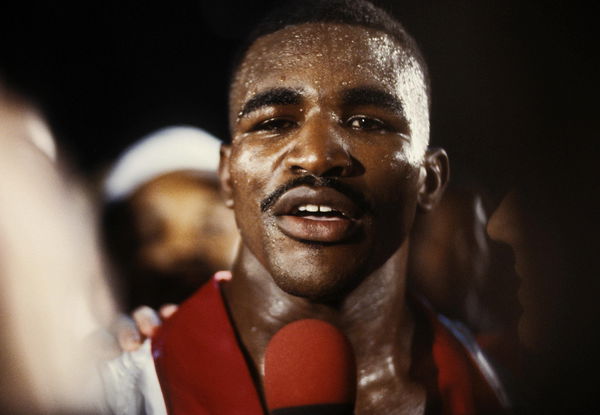
via Imago
US PRESSWIRE Sports Archive Jul 12, 1986 Atlanta, GA, USA FILE PHOTO Evander Holyfield is interviewed follwoing his win over Dwight Muhammad Qawi not pictured in their 1986 cruiserweight title match at the Omni. Holyfield defeated Qawi by split decision. Atlanta Georgia UNITED STATES, EDITORIAL USE ONLY PUBLICATIONxINxGERxSUIxAUTxONLY Copyright: xMannyxRubio-USAxTODAYxSportsx 3819133

via Imago
US PRESSWIRE Sports Archive Jul 12, 1986 Atlanta, GA, USA FILE PHOTO Evander Holyfield is interviewed follwoing his win over Dwight Muhammad Qawi not pictured in their 1986 cruiserweight title match at the Omni. Holyfield defeated Qawi by split decision. Atlanta Georgia UNITED STATES, EDITORIAL USE ONLY PUBLICATIONxINxGERxSUIxAUTxONLY Copyright: xMannyxRubio-USAxTODAYxSportsx 3819133
In the opening round of the July 12, 1986, bout at Atlanta’s Omni Coliseum, a 5′ 6″ Dwight “Camden Buzzsaw” Qawi taunted the unbeaten Evander Holyfield (then 11–0) in front of his hometown crowd. Qawi slipped under one of Holyfield’s jabs using his signature bob‑and‑weave and then stood chest-to-chest inside range. After landing solid body shots, Qawi subtly lowered his gloves and smirked at the 25-year-old, who had challenged him to a fight very early into his career.
Qawi was 33 at the time and had walked into the Omni as a feared, battle-tested champion with 15KOs under his belt. But after gruelling 15 rounds, he suffered the first split-decision loss of his career. The close-quarters fight, later dubbed “The best cruiserweight bout of the 1980s” by the Ring Magazine, had resulted in 44–140 and 147–138 for Holyfield, and 143–141 for Qawi. “I knew what he could do. I seen he was a mean guy; he don’t let up on nobody….real strong guy, good fighter. He was older, and he was smarter.” Holyfield would later say.
After losing to Evander Holyfield in 1986, Dwight Muhammad Qawi continued fighting but never could reclaim a world title again. He faced Holyfield again and had a loss to George Foreman in a high-profile matchup before retiring in 1998 with a 41–11–1 record and 25 knockouts. Post-retirement, he was inducted into the International Boxing Hall of Fame in 2004, stayed involved in the sport, and worked as a rehabilitation counselor in New Jersey. In his later years, Qawi developed dementia, which progressively worsened. He died on Friday at age 72 at Cooper University Hospital in Camden, New Jersey, after living with the condition for five years. His sister, Wanda King, confirmed the same in a statement to the Boxing Scene.
“He was a great father, a great Pop-Pop to his grandchildren,” King told BoxingScene. “He had a heart of gold, and he fought his dementia illness just like he was fighting in the ring. He went out like a champ…. Right to the end.”
ADVERTISEMENT
Article continues below this ad
Even decades after his prime, Qawi remained a revered figure in boxing circles—not just for his accomplishments in the ring, but for how he achieved them. Known for his swarming, high-pressure style that smothered taller opponents, Qawi made a career out of defying physical disadvantages. At just 5′6″ with a 71-inch reach, he fought—and beat—men much larger, including the likes of Matthew Saad Muhammad and Leon Spinks. It was this compact frame and defensive mastery that earned him the nickname “The Camden Buzzsaw,” but it was his backstory that gave the name weight.
ADVERTISEMENT
Article continues below this ad
View this post on Instagram
Long before titles, taunts, and toe-to-toe battles, Dwight Muhammad Qawi was just Dwight Braxton—a child born into poverty in Baltimore and raised in Camden, New Jersey, where he dropped out of high school by tenth grade and turned to street crime. By his early twenties, he was serving time for armed robbery at Rahway State Prison. It was there, in the prison boxing program run by former pro James Scott, that Qawi discovered the sport that would reshape his life. After his release in 1978, he turned pro and within just a few years became a two‑division champion, first at light heavyweight and then at cruiserweight— proof that redemption was possible. And now, following news of his passing, tributes have begun pouring in from fans across the sport.
ADVERTISEMENT
Article continues below this ad
From the Spinks loss to ‘Pandemonium‘ with Holyfield and life beyond the ring
Fans who watched Qawi in his prime remember him not just as a champion, but as one of the sport’s most relentless in-fighters. “Saw him fight Holyfield in Atlanta at the Omni. Great fighter,” one wrote, pointing back to the 1986 war that ranks among the greatest cruiserweight bouts ever staged. Others recalled similar battles, like his blood-and-guts TKO victory over Matthew Saad Muhammad in 1981: “Love the wars with Saad Muhammad!!!!” posted another. “He had that one pretty good fight with Foreman in the 80s I remember him 🕊️🕊️,” another user noted, referencing the bout where Qawi went ten rounds against the hard-hitting ex-heavyweight champ, despite being massively undersized.
His backstory came up just as often. “I might be wrong, but I remember him having a boxing match at a prison?” one user asked, referring to Qawi’s debut fight at Rahway State Prison, where he trained under James Scott while serving time. Fans who followed his journey from incarceration to the International Boxing Hall of Fame saw him as more than just a fighter. “Short king, rest easy champ,” one comment read, a nod to his 5′6″ frame, which never stopped him from taking on men much larger and favored. To those who watched him fight or followed his story, Qawi was unforgettable.
What’s your perspective on:
Was Dwight Muhammad Qawi the most underrated fighter of his era, or did he get his due?
Have an interesting take?
ADVERTISEMENT
ADVERTISEMENT
ADVERTISEMENT
ADVERTISEMENT



Was Dwight Muhammad Qawi the most underrated fighter of his era, or did he get his due?